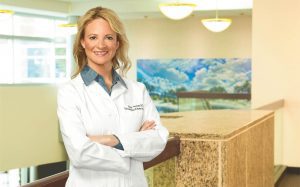

Here in southwest Florida, it’s a real concern.
Most skin cancers are caused by the sun’s ultraviolet (UV) rays, which can cause DNA damage. But there is one simple step we can take to help protect our skin, says Jacqueline Thomas, D.O., a dermatologist with Physicians Regional Medical Group. Apply a broad-spectrum sunscreen with an SPF of 30 or higher.
“A golf-ball size or shot-glass amount is the quantity recommended for one body application,” Dr. Thomas says. “Consistent use is key, and you should reapply every two hours of exposure.”
While sunscreen certainly helps, it should not be the only tool in your arsenal. Broad-brimmed hats, sunglasses, and sun-protective clothing with UPF of 50+ or higher can help, too. Don’t depend on baseball hats, Dr. Thomas says, because the nose, cheeks, chin, and ears remain unprotected.
Parents should pass their good habits down to children, with the use of sunscreen becoming second nature to young ones. When it comes to children, it is important to learn sun protection habits early, Dr. Thomas says,
“The use of sunscreen should become second nature to children. You would not have a child get into a car without a seatbelt; the same should apply to children and sunscreen,” Dr. Thomas says. “Skin damage starts early when not protected.”
In addition to being vigilant about protecting your skin, undergoing regular skin checks with a dermatologist can help catch potential skin cancers in early stages, when they are most treatable. If you choose to check your skin at home, it may be helpful to follow ABCDE.
. A- Asymmetry: Draw a line down the center of a lesion. If the two sides do not match identically, the lesion is asymmetric and is, therefore, something to be checked.
. B- Borders: Irregular borders that are scalloped, jagged, or have notches should be evaluated.
. C- Color: One monotonous color is usually safe. If there are multiple colors, this can be a warning sign.
. D- Diameter: If a lesion is larger than 6mm, or the size of a pencil eraser, it should be examined.
. E- Evolving: A patient should know their skin better than their doctor or anyone else. If a lesion is changing or evolving over time, that can be suspicious.
Remember that some melanomas occur in moles that we already have. When in doubt, get it checked out.
From skin cancer to skin acne, Physicians Regional Medical Group offers diagnostic services and treatment options for a range of skin conditions.
. A- Asymmetry: Draw a line down the center of a lesion. If the two sides do not match identically, the lesion is asymmetric and is, therefore, something to be checked.
. B- Borders: Irregular borders that are scalloped, jagged, or have notches should be evaluated.
. C- Color: One monotonous color is usually safe. If there are multiple colors, this can be a warning sign.
. D- Diameter: If a lesion is larger than 6mm, or the size of a pencil eraser, it should be examined.
. E- Evolving: A patient should know their skin better than their doctor or anyone else. If a lesion is changing or evolving over time, that can be suspicious.
Remember that some melanomas occur in moles that we already have. When in doubt, get it checked out.
From skin cancer to skin acne, Physicians Regional Medical Group offers diagnostic services and treatment options for a range of skin conditions.
Our board-certified dermatologists take the time to listen to your concerns and develop a treatment plan to meet your needs. We offer a range of medical, surgical and cosmetic dermatology services to address a variety of skin care needs, including:
. Diagnostics and preventive care
. Acne treatment
. Treatment for aging and sun-damaged skin
. Skin cancer surgery
. Skin cancer screenings and treatment
. Photodynamic therapy for treatment of precancerous and superficial skin cancer
. Mole removal
Dr. Thomas is located at 8340 Collier Blvd. Naples, FL, 34114. To request an appointment, please call (239) 348-4222 or visit PhysiciansRegionalMedicalGroup.com.
 Southwest Florida's Health and Wellness Magazine Health and Wellness Articles
Southwest Florida's Health and Wellness Magazine Health and Wellness Articles

